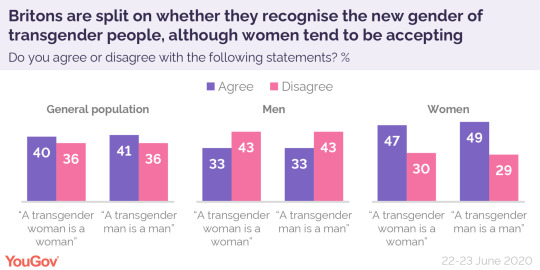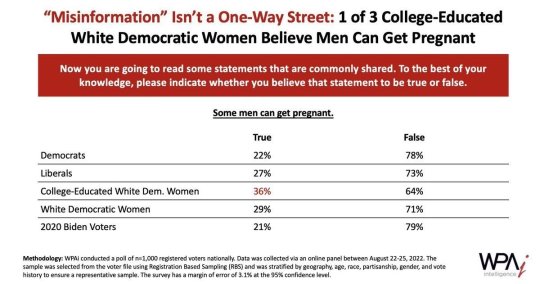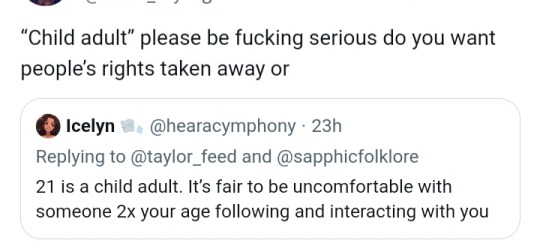#infantilization
Text
The whole “your brain doesn’t finish developing until 25” spiel has fucking ruined society I swear. It’s such a gross misunderstanding of the original study it’s laughable, and yet people use it as scientific evidence that infantilising young adults (usually women or people perceived to be women lbr) is ethical actually.
YOUR BRAIN IS CONSTANTLY CHANGING AND DEVELOPING YOUR ENTIRE LIFE. YOU DON’T SUDDENLY WAKE UP ON YOUR 25TH BIRTHDAY WITH ALL THE MATURITY AND KNOWLEDGE YOU NEVER PREVIOUSLY POSSESSED. STOP SPREADING THIS NONSENSE
#Inspired by the Cass report and the fact it’s also spreading this bs and using it to deny trans healthcare#pseudoscience#neuroscience#infantilization#brain development#cass review#cass report#transphobia#trans rights#rant#vent#psychology#psychiatry
373 notes
·
View notes
Text
one thing that really bothers me in the conversations about transandrophobia is how people imply that infantilization isn't a Big Deal.
The posts I've seen argue that being infantilized just hurts feelings and trans men/mascs just have to get thicker skin.
This is so incredibly hurtful for so many reasons. I want to think more on it and add to this post later but I just wanted to get it out there that the idea that infantilization is just hurt feelings and doesn't lead to loss of body autonomy and rights makes me want to scream
1K notes
·
View notes
Text
realizing pomni feels infantilized and joked at by the game since it made her room too big and filled it with toddler toys and the fact her avatar is a jester is not the level of relatability I was expecting from this character
shes 25, she probably has a job and some mental issues to deal with irl, considering how anxious she is, at the same time we can tell she doesnt enjoy being pushed around and not being taken seriously by anyone (except maybe ragatha)
that dichotomy of "im not a baby, please take me seriously" and "Im a failure, someone please help me, im overwhelmed" is like... literally me

#kind of a joke but at the same time not really#pomni#analysis#tadc#anxiety#infantilization#the amazing digital circus#character analisys#vent#I guess#relatable
137 notes
·
View notes
Text


Fandoms, stop infantilizing adults in their 20s challenge.
90 notes
·
View notes
Text
By: Louise Perry
Published: Jun 8, 2023
When we get home from the supermarket, our two-year-old likes to assist with taking the groceries out from underneath his stroller and carrying them to the kitchen. He will pick up a carton of milk and heave it towards the fridge like an atlas stone. “Well done darling” I say to him in a pitch slightly higher than usual, “you’re being so helpful.”
Of course he isn’t actually being helpful. In fact, he’s slowing down the process of unpacking and risking an enormous milk spillage all over the kitchen floor. But my goal is encouragement and kindness – he’s only two, bless him, and that carton is awfully big and heavy.
My husband regards these exercises with more of a gentle briskness. “Thanks mate” he’ll say in his usual tone of voice, excising my white lie. In this, I’ve learnt, my husband is typical of other men. In a 2015 study led by Mark VanDam, a professor in the Speech and Hearing Sciences department at Washington State University Spokane, researchers outfitted preschoolers and their parents with recording devices to monitor social interactions over the course of a normal day. The mothers, they found:
… used higher pitch and varied their pitch more when interacting with their child than with adults. The fathers, on the other hand, did not show the same pattern, and instead talked to their children using intonation patterns more like when they talked to other adults.
As an instinctive speaker of so-called ‘motherese’ – that is, baby talk – I find that when our son mispronounces a word (‘tawtah’ for ‘water’ or ‘mulack’ for ‘milk’) I will automatically echo it back to him, while my husband will automatically respond with the correct pronunciation. These differences persist despite the fact that we share childcare almost exactly equally within our family.
It turns out we’re not alone in this sex difference, and that it may well have some adaptive purpose. "We think that maybe fathers are doing things that are conducive to their children's learning but in a different way,” writes VanDam, “the parents are complementary to their children's language learning.” Mothers speak down to children, while fathers speak to them like equals – in combination, these two kinds of stimuli promote the development of adult language.
The adoption of motherese is an instinct that, in its correct context, is both comforting and developmentally useful. But it can also, in some circumstances, be dysfunctional. And, as I have become more and more fluent in it, I have started to notice that motherese is no longer confined to the nursery or the classroom, but is now to be found also in public life. Not in its full expression – “have you got a boo-boo, honey?” – but in a more subtle form.
I heard a lot of motherese, for instance, in the responses to philosopher Kathleen Stock’s appearance this week at the Oxford Union – a political event considered significant enough to attract commentary from the Prime Minister and rolling updates on the homepages of several national newspapers.
Students at risk of being traumatised by Stock’s mild-mannered, centre-left brand of politics were ushered towards ‘welfare rooms’ offering ear plugs, bottles of water, and snacks. “The Union has made the choice to amplify a voice that actively harms trans students, trans people and the trans community at large” wrote one student politician, “we’re tired of [the Union’s] refusal to listen to the communities they hurt” insisted another. It was as if Stock was a rampaging bully on the playground, knocking other children to the ground, and her critics were leaping to the defence of the persecuted toddlers.
Witnessing the backlash against her, you’d never guess that Stock’s only sin is to offer a careful academic critique of the doctrine of gender identity – that is, the claim that one can become a member of the opposite sex (or some other identity category in between) merely by force of will. As she reiterated in her Oxford Union speech, to reject this doctrine is not to deny the humanity of trans people, but rather to balance their interests against those of other people, particularly women.
But I am by no means the first to notice an unexpected feature of the crowds that formed outside the Oxford Union this week, and indeed all of the crowds that congregate in support of trans activism (now a regular occurrence, and not just in the Anglosphere). While the occasional acts of outright aggression are overwhelmingly committed by men, the crowds in general are mostly composed of young women.
Polling reveals this to be a wider pattern. In the UK, women – and particularly young women – are far more supportive of trans activism than are their male counterparts. The same gap can be seen in US polling. The public figures who have received the most flak for their criticisms of trans activism are disproportionately women – I’m thinking not only of Kathleen Stock, but also of JK Rowling – and yet so, too, are the movement’s most devoted allies. This is, in the main, an intra-female conflict.
But if trans activism poses a threat to women’s interests – as Stock and Rowling insist that it does – then why have so many women come out in support of it? I want to propose two explanations for this seeming paradox.
Firstly, in socioeconomic terms, the women who have the most to lose from the disintegration of female-only spaces – prisoners and domestic abuse victims, for instance – are not actually the same women who are draping themselves in blue and pink flags outside the Oxford Union. This is a textbook example of what Rob Henderson has termed a ‘luxury belief’ – an idea that confers status on the rich, while causing harm to the poor.
But then I am begging the question, because why on earth would trans activism confer status on the rich, or indeed anyone? This is where we come to the second factor: the extraordinarily well-documented differences in personality that have been observed between male and female populations cross-culturally.
Note that there is a crucial distinction to be drawn between average and absolute differences. It is not true that all men or all women exhibit only masculine or feminine personality traits, in the same way that not all women are short and not all men are tall – rather, average differences between the sexes are obvious only at the population level.
One trait on which men and women differ substantially is agreeableness. To put it bluntly, women are usually nicer than men – that is, they are “more nurturing, tenderminded, and altruistic more often and to a greater extent than men,” as psychologist Professor Yanna Weisberg puts it.
This nurturing instinct often finds its way into polling on political questions. For instance, a typical study from 2017 asked 3,014 college students the following question: “If you had to choose, which do you think is more important, a diverse and inclusive society or protecting free speech rights.” 61% of male students chose to prioritise free speech, compared with only 35% of female students – exactly what you would expect from two populations that differ in this most crucial of traits.
Don’t think that I’m bashing agreeableness per se – it’s one of those personality traits that really does offer advantages and disadvantages all along the spectrum. Disagreeable people are often rude, but they can also be refreshingly honest; agreeable people are often pleasant, but they are easily taken advantage of. Think of agreeableness as motherese: soothing and lovely in the right circumstances, cloying and foolish in the wrong ones.
The problems arise when an agreeable style of politics gloms onto a group that seems to offer plentiful opportunities for babying. Right now, it is trans people who have found themselves in the hot seat (or the high chair). For just one example of this babying tendency in action, observe the progressive response when then-66 year old Caitlyn Jenner came out as trans (a response parodied exquisitely in a South Park episode titled ‘Stunning and Brave’). When Glamour honoured Jenner as the magazine’s 2015’ Woman of the Year' – despite the fact that Jenner had not yet lived as a woman for a full year – I couldn’t help but hear the high pitched notes of motherese (“you look so pretty sweetie”, “well done that was very brave.”)
Observe, too, the trans celebrity Dylan Mulvaney’s recent appearance on Drew Barrymore’s talkshow, which culminated with Barrymore kneeling on the ground, looking Mulvaney straight in the eye, and offering a heartfelt pep talk on self-love. Some gender critical feminists looked at this scene and saw a woman prostrating herself before a man. What I saw was a mother kneeling down to reassure a young child – for some bizarre reason, Barrymore was speaking motherese to a grown adult on national TV.
At the risk of stating the obvious, trans people are not babies. Nor are they pets. They do not need earplugs and snacks to withstand an academic discussion, and they do not need to be spoken to like toddlers. Real two-year-olds may benefit from the gentleness of motherese. The rest of us need to grow up.
==
https://policyexchange.org.uk/wp-content/uploads/2022/11/The-Politics-of-the-Culture-Wars-in-Contemporary-Britain.pdf#page=57
Women are more likely than men to say a trans women should be able to enter a women’s refuge, favouring this by a 36-32 margin while men oppose it 40 to 30. In fact, across all 6 questions pertaining to the trans issue (Stock, Rowling, refuges, gender identity, pronouns, teaching biological sex), women are significantly more supportive of the trans rights position even when ideology is taken into account. Women even exceed LGBT identifiers in their support for the pro-trans position on many questions.
Why? Is this not against the female interest? The likely answer is that women are more likely to be cultural leftists than men across most of the 25 attitudinal items in the survey. The inclination to empathise and care for groups perceived as vulnerable best accounts for the pattern. The result of the empathy dynamic is that the gender-critical feminist position, while intellectually prominent, is still a contested view among women. Indeed, the largest source of opposition to greater trans access to women’s spaces comes from cultural conservatives.


This isn't a war between men and women, as some would like to assert.
It's really a war between different denominations of feminism. Like Catholicism vs Protestantism. Or Sunni vs Shi'a Islam.
One thing that's hilarious and worth pointing out: gender-critical feminists will sometimes say things along the lines of, well that agreeableness was socialized into women by "the patriarchy" to make them compliant. Which means they're denying the same evolved sex-based differences that they started off defending. Like claiming to be a Catholic while denying transubstantiation.
Either sex-differences are real, and can explain different participation rates in physics and kindergarten teaching, different career priorities and trajectories (and thus, the mythical "pay gap") and different work patterns as readily as they explain differences in swimming, cycling and weight-lifting performance, making "the patriarchy" as unnecessary as a god is to the existence of the universe... or they're not, and the gender-critical argument goes up in smoke in the flames of social constructivism. God can't be both good and unknowable.
#Louise Perry#stunning and brave#gender activism#gender ideology#queer theory#genderwang#motherese#infantilization#mothering#western feminism#sex based differences#sex differences#religion is a mental illness
165 notes
·
View notes
Text
I’m hereby gatekeeping wylan van eck because no one knows how to treat him like anything other than a defenseless baby, and I’m sick of it
#six of crows#wylan van eck#wylan hendriks#crooked kingdom#leigh bardugo#grishaverse#stop infantilizing him#y’all are ruining his character#some people should not be allowed to write Wylan#six of crows duology#infantilization#stop it
69 notes
·
View notes
Text
being a tomboy is only marginally accepted in very young children, and then you are expected to grow out of it by the time you reach puberty. which is also why adult trans men are told they just don't want to grow up. all the stories i read as a child with masculine girls, they always became feminine at the end as they matured and it filled me with shame and dread because i knew that is what everyone expected of me too, and it only gets worse as you get older. come on, when are you going to have a glow up and put effort into being presentable? you looked so pretty with long hair, why did you have to cut it? i know this is just a phase, you will grow out of it eventually, i don't care that you're in your 20s you are immature and your brain isn't fully developed so you can't really know you are trans!
60 notes
·
View notes
Text
Speaking of double standards regarding cishet White men bad behavior. Think of how pple reacted to Zac Efron spreading misinformation on his Netflix show vs Oprah Winfrey platforming quacks. Pple in this youtube video's comments section being like, "that guy seems to be a bad influence on Zac Efron". Talking about Zac Efron like he's a teenager and not a grownass 30-something year old man who can make his own damn decisions. My god, the infantilization. Maybe the himbofication of White men is not always a good thing.
66 notes
·
View notes
Text
hot take but if you can only enjoy an autistic character when they’re being woobified and infantilized and you actively go out of your way to ignore or refute any of their actual personality and adult traits to keep woobifying them then maybe you just don’t like autistic people
#already made this post but fuck it we’ll do it again#draft post#autism posting#autistic characters#jack kline#spn#autistic jack kline#baby jack#fandom crit#woobification#infantilization#teehee
112 notes
·
View notes
Text
Will forever despise all the social media parents who exploit their autistic children, and parade them around like they’re zoo animals to be gawked at. What the actual fuck even is this. The most patronizing, infantilizing ableist shit.
“Omg see he’s so happy!”
“Omg he loves eating food!”
“Omg she’s smiling!”
“Omg he’s just like everyone else!”
Fuck you. Fuck you. Fuck you. Fuck all of you. Autistic people are not fucking zoo animals or entertainment.
Don’t even get me started on them using their children to demonize autism and basically insinuate that they deserve to be cured of their “tragic” life.
FUCK. YOU.
(Side note: a fucking radfem touched my post. Ew Ew Ew.
RADFEMS, GENDER CRITICALS, TERFS AND OTHER MISOGYNISTS AND TRANSPHOBES, FUCK OFF.
Signed, a ✨ Tranny ✨)
#autistic#autism#ableism#infantilization#patronizing#eugenics#exploitation#child abuse.#tw child abuse#parental abuse#abusive parents
361 notes
·
View notes
Text
"During my freshman year of college, my psychology professor said, 'Everything is about sex. You are here, at this university, in this class, because you want to have sex...You came to college so that you can go to parties, meet people, and have sex. And so that you can graduate with a degree that will allow you to get a good job so that you can be an eligible dating and marriage prospect, and have sex.' All around me, heads nodded while I sat in confusion, unable to wrap my head around the assertion that everything is about sex.
I was already exceedingly aware of the fact that my lack of investment in seeking out sexual encounters alienated me from my college peers, especially because some of the people closest to me made it clear, in one way or another, that there was something 'abnormal' about this, about me. They viewed me as immature and undeveloped; some even pitied me. I needed to 'grow up' or else I would 'end up alone,' they’d warn. I referred to myself as a 'late bloomer' for many subsequent years, often as a sort of apology or disclaimer. Only after affirming my asexuality did I understand that this 'late bloomer' rhetoric was an unhelpful sentiment and a reinforcement of the same ideologies that caused others to treat me like an abnormality in the first place. One does not 'bloom'—as in, enter into sexual exploration—too late, because there is no set time frame in which one must 'bloom.' One is not required to 'bloom' in this way at all.
Infantilization is a dehumanizing process by which a self-righteous sense of superiority is wielded over someone seen as inferior—assumed to be less mature, more naive, and less worthy of respect. It’s closely akin to and often comes with a heaping side of patronization and condescension, with the infantilized being spoken to and treated as if they are unintelligent, unimportant, deserving of pity, and in need of guidance and education from those who are allegedly more superior and more knowledgeable about the world. This often manifests as the infantilizer regarding themselves as more qualified to make decisions on behalf of and about the infantilized, whom they regard as childlike and incapable of making these determinations on their own...
According to one study, 'Societal Challenge and Depression, Self-Esteem and Self-Concept Clarity in Asexuals,' 69.4 percent of the asexual participants report having had their identity challenged, and the vast majority of those challenges came in the form of infantilization, with phrases like 'you are a late bloomer' or 'you have not met the right person yet' being offered in response to them revealing their asexuality or simply being noticeably disinterested in sex. The association of asexuals with childishness and immaturity reproduces much of the same disregard and dismissive attitudes that are typically directed toward actual children. I understand the infantilization of asexuals as its own brand of gaslighting, in which seeds of doubt are continually planted in our minds and cause many of us to question our experiences, desires, and perception of self.
-Sherronda J. Brown, Refusing Compulsory Sexuality: A Black Asexual Lens on Our Sex-Obsessed Culture
74 notes
·
View notes
Text
As someone with an intellectual disability, and someone who has met and seen other intellectually disabled people on the internet, we are treated very differently.
I’m very open about my intellectual disability online. It’s the easiest way to know someone’s true intentions and meet people who just don’t care and are really chill about it.
In online spaces, especially online spaces made for neurodivergent folk, I’ve been treated drastically different. I’ve been treated a lot nicer. People are kinder, people are more patient, people explain things more to me. And although this is great, sometimes it’s really unneeded, and I wish they treated me like everyone else. I don’t need your extra kindness. I don’t need you treating me like I’m some child, or someone you have to be careful with your words with.
I’ve seen this with other people with intellectual disabilities. I’ve seen people claim to have an intellectual disability and get out of being banned from servers for doing horrendous things , because obviously we don’t know better. (/sarcasm)
I have so much more to say, but the bottom line is, we’re treated drastically different. Please, unless we say otherwise, then treat me the same. I want to be able to go into adult spaces, or be around peers without being treated like a child. I’m an adult. I should be treated as such.
#intellectual disability#borderline intellectual disability#intelligence#online spaces#infantilization
115 notes
·
View notes
Text
Someone in their 20s. A """""child adult."""""
What on earth is going on here? 🤦♀️


#twitter#fandom#adults in fandom#infantilization#wtf?#my posts#how did we get here?#where and when did everything go so wrong?
74 notes
·
View notes
Text
I still remember a post or comment that, in reference to Holmes' neurodivergent traits, that he's "like a child" that Watson needs to be a caretaker to.
I forgot who it was, or where, on when, but i'm still pissed off.
#sherlock holmes#acd sherlock holmes#acd john watson#acd watson#acd sherlock#acd holmes#acd canon#infantilization#ableism
47 notes
·
View notes
Text


for people who get mad at radar ships, see eric's old posts. do we really have to explain that a child would not be left in charge of taking care of beacontown or being an assistant to a very important person in the city with a complex and full schedule?
"uhh he's an intern, he could be a teenager." he worked with jesse for about a year (according to eric), and he also worked with stella before, he has relatively experience in what he does.
why the obsession of proclaiming "child coded" to characters who are simply clumsy or "childish" when radar is only insecure about himself? he is not as tantrum as a child or he is directly an idiot who does not know what is happening, no, he did a lot in a short time and against his will, or let's remember that jesse was also like him in the whiter storm arc and he/she was never called "child coded" despite being quite clumsy in some scenes.
"his tattoos would have been done in prison" you saw how he changes his clothes in a matter of seconds, before going to prison radar he was very terrified, why would he get a tattoo in such a stressful situation?
also, eric already has his hc that he hid those tattoos, it makes sense i guess.
anyway, i still think that the fandom culture in 2017 with calling weak characters "uwu cute little cinamon roll" affected the perspective of how some see radar, also counting the hc popularization of the found family trope with lukas and radar that it seems more like a third wheel lukesse attempt only because radar is more inexperienced than them in episode 2 and lukas mentioned the nostalgia he feels seeing the assistant starting his first adventure. but i didn't go into this hc in depth about that, or at least i didn't see anyone talk about it except for an account here that i think blocked me for being a radesse shipper because i didn't even interact with them :"v
#mcsm#mcsm radar#minecraft story mode#fandom problems#mischaracterization#infantilization#found family discourse#shipping discourse#mcsm jesse#mcsm lukas
51 notes
·
View notes
Text
On Infantilization and Tech

I'll say it because I'm extra spicy today.
I see a lot of folks saying that Tech shouldn't be infantilized, and he should not be kept away from adult relationships.
Got it. 100% agree.
However....
Infantilization isn't just regarding relationships. It also involves how the person is perceived in greater society.
So....when you're writing about Tech, let me ask you:
Is he respected as an adult? His opinion taken seriously?
Are his ideas dismissed as childish or dorky?
Does he have a cool and/or IMPORTANT job? Or is he shoved into Dork Corner dicking around with engine parts?
Is his partner the dominant one who takes charge of everything?
Is it another team member in charge?
Is he contributing in a way that is fulfilling and respectful of his background and knowledge?
Or is he just toddering around until someone rescues him?
I get plot, I understand that character arcs need to happen. But every time I start a fic where Tech's being bossed around or taken care of by someone else, canon or otherwise, I immediately log out.
Why am I saying all of this?
Because I am a neurodivergent person who receives this horseshit on a regular basis.
I'm not a dumbass or lazy. I have a Ph.D and have been working in my field for 16 years. But I have been passed over and mocked and teased and shoved into corners because I'm biologically female, I'm a wife and mother, and I am vaguely on the spectrum.
Poor wittle Dr. Meat Muffin and her weak womanly ways, must help her over puddles and shit.
I'm putting in my yearly review right now. I expect that I will be talked down by my department director, despite performing wildly well.
I will be going to a conference shortly too. My colleagues with the smoother, charming voices will use the grants I wrote as a basis for THEIR grant writing course, of which I am being forced to take.
Learning about writing properly using your own writing as an example is a level of hell I didn't know existed and yet, here I am.
Maybe it's God's punishment for that Spiderman/Tech drawing I did earlier, who the fuck knows.
The point is, when you're writing about neurodivergent people, give them opportunities to use their skills and brains and contribute in fulfilling ways.
There's more than one way to infantilize someone, don't be that person.
Bleh.
#meat muffin's mad#asd#asd life#infantilization#tech talks#writing#tech tbb#the bad batch#tech star wars#i hate my job
51 notes
·
View notes